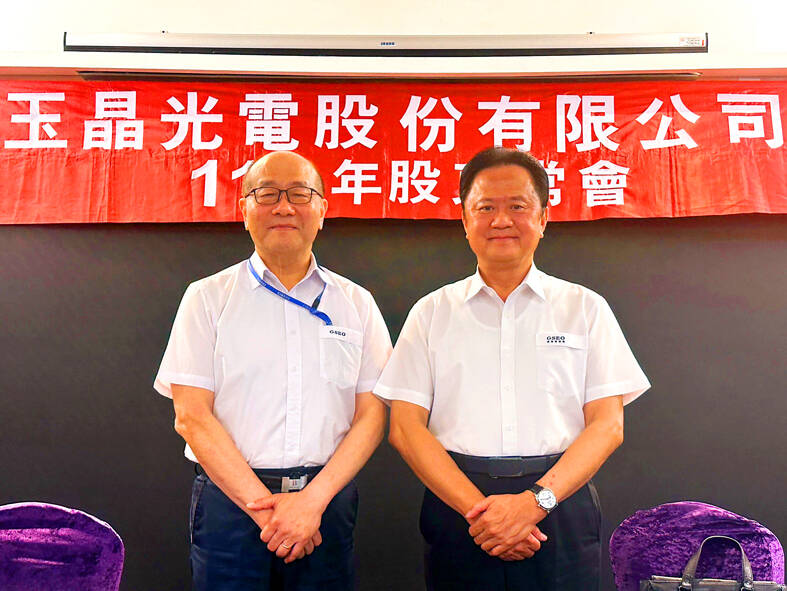Genius Electronic Optical Co (玉晶光), which supplies camera lenses to Apple Inc and Huawei Technologies Co (華為), yesterday gave bullish business prospects for next year, attributable to wider adoption of pricey periscope camera lenses for more smartphones beyond premium models.
That would be a key upgrade in smartphone camera specifications as Genius’ customers at present only equip their flagship phones with such high-end lenses. As customers are mulling expanding the usage of periscope camera lenses to their mid-range models, Genius considers the periscope camera lens business a great boon.
“We are optimistic about the company’s business outlook next year,” Genius chairman Jones Chen (陳天慶) told an online investors’ conference.

Photo: CNA
Genius’ optimism is also built on an upbeat forecast that its Chinese smartphone customers are to see a jump in shipments next year, the company said.
As Genius is seeing an uptrend in demand for its camera lenses used in premium smartphones and some high-end notebook computers, the company is planning to boost the capacity of camera lenses used in mobile phones and virtual-reality (VR) headsets, company president Lee Kuo (郭英理) said.
“Our capacity is really tight now,” Kuo said.
No details about next year’s capital spending were disclosed yesterday, as next year’s budget is still being planned, he said.
Kuo said that VR headsets are a new driving force for its camera lens shipments, as a premium VR headset requires about 10 camera lenses. A mid-range model needs six, while entry-level VR headsets have two or three, he said.
Genius is confident about the outlook of VR devices in the long run, as its customers are developing next-generation products without being discouraged by slow uptake in the initial stage. One of its customers is to unveil a new VR headset next quarter, the company said.
Another customer inked an agreement with China’s Tencent Holdings Ltd (騰訊) to sell its VR headsets in China, which bodes well for the sales, Genius said without identifying Meta as the customer.
VR camera lenses made up about 20 percent of Genius’ total revenue last quarter, it said.
Genius yesterday gave a positive business outlook for this quarter. Revenue this quarter would have better performance than previous fourth quarters in the company’s history, Chen said.
Gross margin this quarter might be higher than last quarter’s 35 percent, attributable to a better yield rate for camera lenses used in VR headsets, he said.
Last quarter’s gross margin fell short of investors’ expectations as the company shipped more VR camera lens modules, which delivered a lower margin due to a less favorable yield rate, smaller production scale and component pass-through costs, the company said.
Commenting on the impact of a patent infringement suit lodged by rival Largan Precision Co (大立光) in Taipei earlier this week, Genius yesterday said the legal disputes did not affect customers’ orders.
Genius said it holds more than 1,000 patents related to the manufacturing of optical products.
Genius’ net profit dipped 21 percent to NT$1.93 billion (US$61 million) during the first three quarters of this year, compared with NT$2.43 billion in the same period last year. Earnings per share dropped to NT$17.02 from NT$21.57.
Gross margin sank to 33.33 percent during the nine-month period, from 38.6 percent in the prior year.

BYPASSING CHINA TARIFFS: In the first five months of this year, Foxconn sent US$4.4bn of iPhones to the US from India, compared with US$3.7bn in the whole of last year Nearly all the iPhones exported by Foxconn Technology Group (富士康科技集團) from India went to the US between March and last month, customs data showed, far above last year’s average of 50 percent and a clear sign of Apple Inc’s efforts to bypass high US tariffs imposed on China. The numbers, being reported by Reuters for the first time, show that Apple has realigned its India exports to almost exclusively serve the US market, when previously the devices were more widely distributed to nations including the Netherlands and the Czech Republic. During March to last month, Foxconn, known as Hon Hai Precision Industry

Taiwan Semiconductor Manufacturing Co (TSMC, 台積電) and the University of Tokyo (UTokyo) yesterday announced the launch of the TSMC-UTokyo Lab to promote advanced semiconductor research, education and talent development. The lab is TSMC’s first laboratory collaboration with a university outside Taiwan, the company said in a statement. The lab would leverage “the extensive knowledge, experience, and creativity” of both institutions, the company said. It is located in the Asano Section of UTokyo’s Hongo, Tokyo, campus and would be managed by UTokyo faculty, guided by directors from UTokyo and TSMC, the company said. TSMC began working with UTokyo in 2019, resulting in 21 research projects,

Ashton Hall’s morning routine involves dunking his head in iced Saratoga Spring Water. For the company that sells the bottled water — Hall’s brand of choice for drinking, brushing his teeth and submerging himself — that is fantastic news. “We’re so thankful to this incredible fitness influencer called Ashton Hall,” Saratoga owner Primo Brands Corp’s CEO Robbert Rietbroek said on an earnings call after Hall’s morning routine video went viral. “He really helped put our brand on the map.” Primo Brands, which was not affiliated with Hall when he made his video, is among the increasing number of companies benefiting from influencer

Quanta Computer Inc (廣達) chairman Barry Lam (林百里) yesterday expressed a downbeat view about the prospects of humanoid robots, given high manufacturing costs and a lack of target customers. Despite rising demand and high expectations for humanoid robots, high research-and-development costs and uncertain profitability remain major concerns, Lam told reporters following the company’s annual shareholders’ meeting in Taoyuan. “Since it seems a bit unworthy to use such high-cost robots to do household chores, I believe robots designed for specific purposes would be more valuable and present a better business opportunity,” Lam said Instead of investing in humanoid robots, Quanta has opted to invest